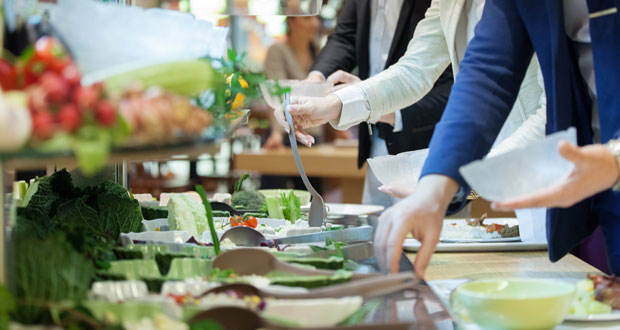 THE RETAIL CATERING PROVIDER’S VIEW
THE RETAIL CATERING PROVIDER’S VIEW
JOSIE TOWNING,
FOOD AND BEVERAGE RETAIL MANAGER, TRINITY LEEDS RETAIL TEAM, MITIE
As we are nearing two years of intermittent COVID-19 restrictions in varying degrees it is clear that consumer habits have changed in approach to shopping, eating out and leisure activities. There has been a huge shift towards home working, with some barely returning to the office and a large percentage adopting a hybrid working model. Many of us have become accustomed to the new normal with a change in daily routine such as shopping local and supporting independent businesses. Alongside this, much of the population has adapted to having a little more personal space when eating out or wearing masks in public, thanks to the vast range of COVID-19 protocols.
However, the pandemic brought a great opportunity for traders among the street food community. Vendors across the UK demonstrated their entrepreneurial approach to street food, by parking up in residential spaces, which quite often sat outside of any delivery platforms radius, and feeding locals with good, honest food, all cooked up with genuine enthusiasm and passion.
Whilst the pandemic brought its own challenges for the industry, most managed to adapt to the new times and continue trading by diversifying their offer through delivery platforms or chilled/frozen meals. When many workforces returned ahead of relaxation of dining restrictions, workplace canteens and cafes were still not easily accessible, many contract caterers struggled to adapt to the intermittent footfall and therefore did not reopen until restrictions fully relaxed in the summer. During this time, business parks and offices started to see street food vans parking in the vicinity, giving customers the chance to shop local and support local vendors.
This concept of street food trucks in place of contract catering or canteens has remained for many businesses who are leading the way. A few examples are The National Theatre at Southbank, London in collaboration with KERB, universities such as Leeds Beckett University in collaboration with local street food vendors and even pubs who closed down their kitchens to begin trading from shipping containers or food trucks in their beer gardens. The success of outdoor dining showed us that consumers are happy to buy from food trucks at all times of the year and even dine outside if they have to.
The change in consumer habits as a result of COVID-19 could be the catalyst for change in traditional contract catering. It may show a way to either integrate small food truck businesses into their catering options for diversity and a competitive edge, or use this proven and reliable concept of food trucks and outdoor kitchens to further utilise indoor space that a traditional contract caterer would occupy.
Some big names in contract catering have recently turned their hand to street food, showcasing their talents in the Contract Catering Magazine Street Food awards with winning chefs from Sodexo, Blue Apple Catering and The Pantry. A great collaboration between the two industries and possibly a sign of things to come in the contract catering sector.
 THE HOSPITALITY SPECIALIST’S VIEW
THE HOSPITALITY SPECIALIST’S VIEW
RONAN HARTE,
CEO, BAXTERSTOREY
We hope that the current guidance from the Government to work from home is just a bump in the road and, as soon as we are over it, we can return to the new normality we were working with within the workplace catering sector. The reality of the situation is that the economy needs to keep moving so we expect there to be a message encouraging people to return to the office wherever possible.
That, coupled with the fact that we have seen a real drive from employers to get their teams back into the workplace, means that we are likely to see more incremental rises in volume back in office as 2022 progresses.
Since the lockdowns have been lifted, sales in our contracts have been stronger as each week passes. Consumer confidence is growing and we were seeing some really positive moves from clients who were increasingly viewing catering as an important part of their business success.
Outside of London has been strong throughout but the seismic shifts were being seen across the capital too. A lot of what we do enhances productivity and collaboration, and clients are seeing this too. As part of the new dynamics at play, consumers are not just looking for good food, but the manner in which this is served/delivered is also a vital part of the mix. We have successfully deployed elements of tech to enhance the user experience, and really tapped into click and collect, prepay and pre-order services.
We’ve also seen a real desire from guests to sit in and enjoy our restaurant spaces. These are now not only seen as places where they can enjoy food they wouldn’t be able to have at home, but also environments where they can collaborate and socialise with colleagues. This has, to some degree, offered a sense of normality for many.
By focussing on the visual element of our food and restaurants, we have seen how a good dining operation can act as a central hub for any organisation. We are essentially the heartbeat of any business.
This has been evident in the increased introduction of free issue and discounted food. Clients are investing more into their catering offer. This has meant that caterers have been in a position to invest even more in training, food development and technology.
Despite the obvious challenges the pandemic has brought, I believe that catering in the workplace has benefitted from recent events and is now regarded as a key differentiator for employers. Given the hybrid approach taken by some businesses, we are also seeing the continued success of our ‘BaxterStorey at Home’ product which enables employees to enjoy our food away from the workplace and on the day’s they are not at the office.
Ultimately, what we hope to come out of the difficulties is a removal of the idea that there is a race to the bottom as far as contract value is concerned. Clients are recognising the importance of catering more than ever and we are pleased to see some fantastic examples of collaboration where both the client and supplier are working towards each other’s mutual interests.
I’m hopeful that the days of supplier taking most of the risk has passed and we are in a place where we are all continuing to work together to ensure that value is achieved across the board.





